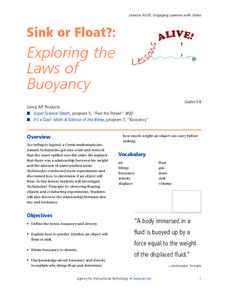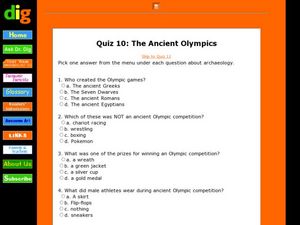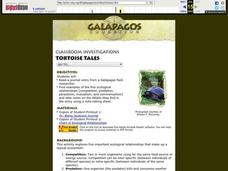Curated OER
Jet Who?
Students explore the emerging budget flight industry and the resulting increased competition among airlines. They compare a budget airline with a legacy carrier in terms of cost, corporate profile, flight statistics, amenities, and...
Curated OER
China: Commodities Consumption
Learners examine the changes that have occured in China's economy. They identify areas of competition between the United States and China. They use the internet to gather more information.
Curated OER
Junkyard Wars-Investigating More Electromagnets
Fourth graders conduct an investigation in order to determine a way to change the strength of an electromagnet's magnetic force. After conducting "control" lifts with their electromagnet, groups make initial changes, record data, and...
Curated OER
Antiseptic Nature of Plants
Students investigate the concepts of homeostasis, competition, pathogens, and antiseptics. They conduct an experiment that compares the antiseptic properties of native plants by growing bacteria on agar plates containing plant extracts,...
Curated OER
The Olympics
Students will research the geography and designa route form Columbia SC to an olympic competition, then follow local news and current events to track team perfomance.
Curated OER
It's in the Cards
Young scholars discover how art auctions have become competitive after reading an article from The New York Times. Students voice their opinions about specific examples of modern art and create trading cards based on their research of...
Curated OER
Sink or Float: Exploring the Laws of Buoyancy
Students explore the relationship between density and buoyancy. After watching a video explaining buoyancy, students discuss displacement and floating. Students have a raft building competition. Afterward, they conduct experiments to...
Curated OER
How Many Penguins Does It Take? Studying Carrying Capacity and Limiting Factors
How does a population's habitat determine the size of that population? Teach learners about carrying capacity and limiting factors with an engaging roleplay activity. Class members pose as a colony of penguins who must gather food amidst...
Curated OER
Pumpkin Roll
Learners build a machine to roll a pumpkin. In this invention lesson, students work in groups to build a machine, in the classroom, that will roll a pumpkin farther than their classmates machines. The lesson ends with a competition.
Curated OER
They're Tilling that Field Behind the Mall
Unfortunately, the article for which this resource was written is not available. You can, however, find another current document on agriculture and urban development for your class to read together, and then still follow the suggested...
Curated OER
Natural Selection and Evidence Worksheet
Matching and fill-in-the-blank exercises give biology whizzes a chance to practice vocabulary associated with evolution. Terms to be reviewed focus on evidence for evolution, natural selection concepts, and some genetics words. You could...
Centers for Disease Control and Prevention
Solve the Outbreak
Pretend to be an Epidemic Intelligence Service officer for the Centers for Disease Control and Prevention. Detectives deal with data and make decisions to determine the dawn of the disease!
Discover Mathematics
Equivalent Fractions Game: Three in a Row
Dice up fractions and bring this game into the classroom. Players roll dice to create fractions, and then have to find an equivalent fraction on the board. Once they get three in a row, they win!
NOAA
Biological Oceanographic Investigations – Call to Arms
How many simple machines does it take to make a robotic arm? An inquiry-based lesson explores that topic and challenges pupils to build a robotic arm that can stretch, turn, and more. A few questions help guide them in the...
Purdue University
Simple Machines – Dog Gone It!
How can people use simple machines to solve real-world STEM problems? Learn about simple machines using a hands-on, project-based learning activity. First, pupils investigate and evaluate simple machines. Then, they receive a task that...
Curated OER
Best Practices of Technology Intergration
Students compete in a Lego Robot Competition. In this after school activity, students design and compete in the Lego Robot Competition. This activity includes time-lines and guidelines for an after-school club.
Curated OER
The Market Power Game
Young scholars play a game to evaluate the power of competition in the four types of market structures. They describe characteristics and give examples of pure competition, monopolistic competition, oligopoly, and monopoly.
Curated OER
Modern Marvels
Learners examine the man-made wonders of the world. In this current events instructional activity, students research selected websites to learn more about the most recent wonders of the world competition. Learners also research Stonehenge.
Curated OER
Track and Field Olympics
Middle schoolers practice the long jump, the triple jump, the shot put, the hammer throw, and the 50 yard sprint in a mock Olympic track and field competition.
Curated OER
The Ancient Olympics
In this Olympics worksheet, 6th graders study about ancient Olympic competitions. Students respond to five multiple choice questions.
Curated OER
Cooperative Learning
Learning can be structured competitively, so that students work against each other; individually, so that students work alone; or cooperatively, so that students work together to accomplish shared learning goals.
Curated OER
People, Places and Events
Pupils cooperate within a small group, review materials covered in previous lessons, use higher level thinking skills and gain positive feedback through competition.
Curated OER
Tortoise Tales
Students read journal entry from a Gal??pagos field researcher, find examples of five ecological relationships (competition, predation, parasitism, mutualism, and commensalism) and take notes on the details they find in the entry using a...
Other popular searches
- Perfect Competition
- Competition Predation
- Animal Competition
- Fair Competition
- Monopolistic Competition
- Species Competition
- Sports Competition
- Global Competition
- Profit and Competition
- Tongue Twister Competition
- Business Competition
- Cultural Competition

























